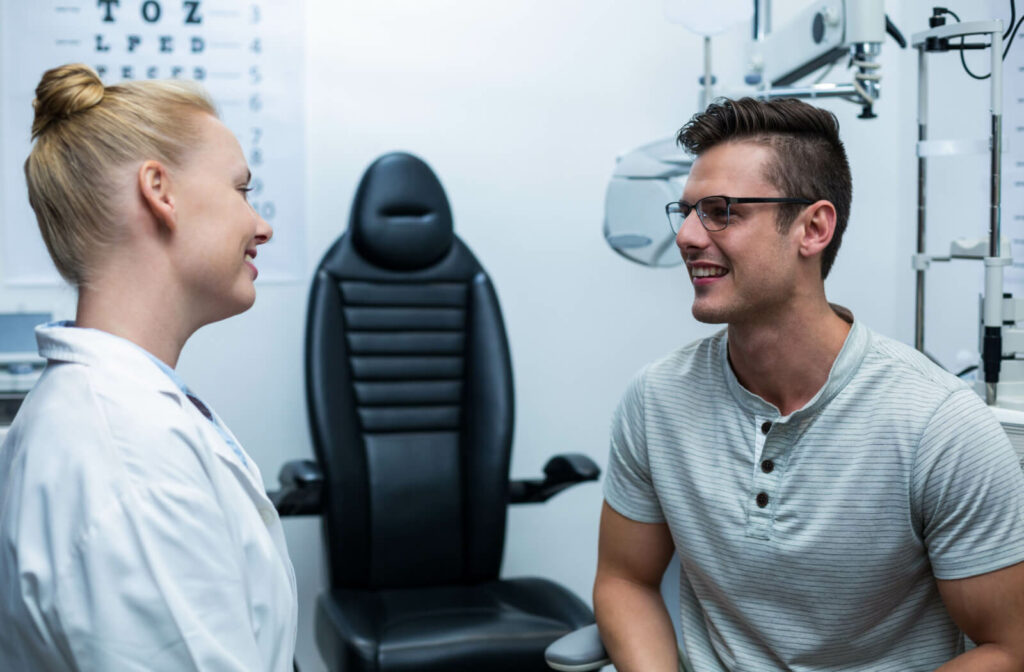That pressurized feeling behind the nose and eyes—it’s likely sinus problems. It can be extremely uncomfortable—especially since the sinuses are so close to the eyes. Sinus issues can cause plenty of problems and can be hard to treat without professional help. But can sinus problems cause eye problems, or is another eye condition the culprit?
Because the sinuses are located right around the eyes, they can also cause vision issues, watery eyes, and more. The sinuses become inflamed and can swell, putting pressure on your visual system and causing your eye problems.
What Are Sinuses?
The sinuses are air-filled cavities located throughout the front of your skull. They’re hollow and help to carry air through your respiratory system. And along the way, they catch bacteria from the outside air, sending it down the throat to be destroyed in your stomach acid. Think of them almost like a filter for the air you breathe.
There are four types of sinuses in the face:
- The maxillary sinuses, on the sides of your nostrils near the cheekbones
- The ethmoid sinuses, between the eyes near the bridge of your nose
- The frontal sinuses, in the forehead just above the eyes
- The sphenoid sinuses, deep within the skull behind the nose and eyes
What Causes Sinus Problems?
Because sinuses help to catch bacteria, they can sometimes become infected or inflamed. The bacteria can rest in the tissue of the sinus itself and cause swelling, putting pressure on the surrounding areas in the face.
These infections or inflammation can be caused by:
- Colds
- Allergic reactions
- A weakened immune system
- Dental problems (because the sinuses run close to the jaw)
- Particularly dry air
- Environmental irritants and pollutants
When the sinuses start to have problems, it’s often called “sinusitis.” These airways become blocked, letting bacteria rest and start to spread. This causes those feelings of pressure and irritation.
How to Tell if You Have a Sinus Problem
But how do you tell if you have a sinus problem—especially if you’ve never had one? There are a few signs you can keep an eye out for:
- Feelings of pressure around the nose, eyes, forehead, or jaw
- Pain
- Nasal congestion
- A constantly runny nose or post-nasal drip
- Headaches
- Fatigue
- A sore throat or cough
- Bad breath
If you notice any—or all—of these symptoms, you likely have a sinus infection. It’s important to note that these symptoms can vary on a person-to-person basis, and may be more or less severe depending on your situation.
Can Sinus Problems Affect the Eyes?
The sinuses are extremely close to the eyes. You have these airways behind, beside, and just under your eyes. So when the sinuses become inflamed and start to swell, they can put small amounts of additional pressure on your visual system.
This can lead to some degree of:
- Eye pain
- Redness
- Swelling
- Blurry vision
Plus, sinus infections can also put pressure on the tear ducts. This can lead to dry eye disease developing since your system needs to work harder to get tears into your eyes. Or, it can do the exact opposite, and cause the tear ducts to produce too many tears and flood your eyes, making them watery and uncomfortable.
This means it is essential to find out what’s causing your sinus infection to get treatment!
How to Treat Sinus Problems
So how exactly do you treat sinus problems? It depends on the severity of the infection.
For milder cases, over-the-counter decongestants can help. These can be oral medications or in a spray form. This helps to reduce the congestion and takes some pressure off your sinuses.
It can help to try a saline nasal rinse as well. This helps to clear out excess mucus and can bring you some relief. You can also try using a warm compress around your face—it stimulates blood flow to the inflamed areas and helps to promote the healing process.
There’s an extremely important thing to note, though. When you start experiencing eye problems, you should always make a point to visit your optometrist. Sinus problems can cause swelling, redness, and blurry vision, but many other eye conditions can do the same. It’s important to get a diagnosis from an experienced professional to get a clean bill of health and find out what’s causing your eye problems.

Can an Optometrist Treat Sinus Problems?
Optometrists primarily focus on your eye health and vision, so if you start to experience eye problems due to your sinus issues, it can help to visit a professional team—like ours here at Griffin Optometric Group. We can give you advice for maintaining your vision and managing your symptoms—and find out if it’s your sinuses causing eye problems or something else.
It’s always a good idea to get a professional diagnosis, so book an appointment with our team today!



